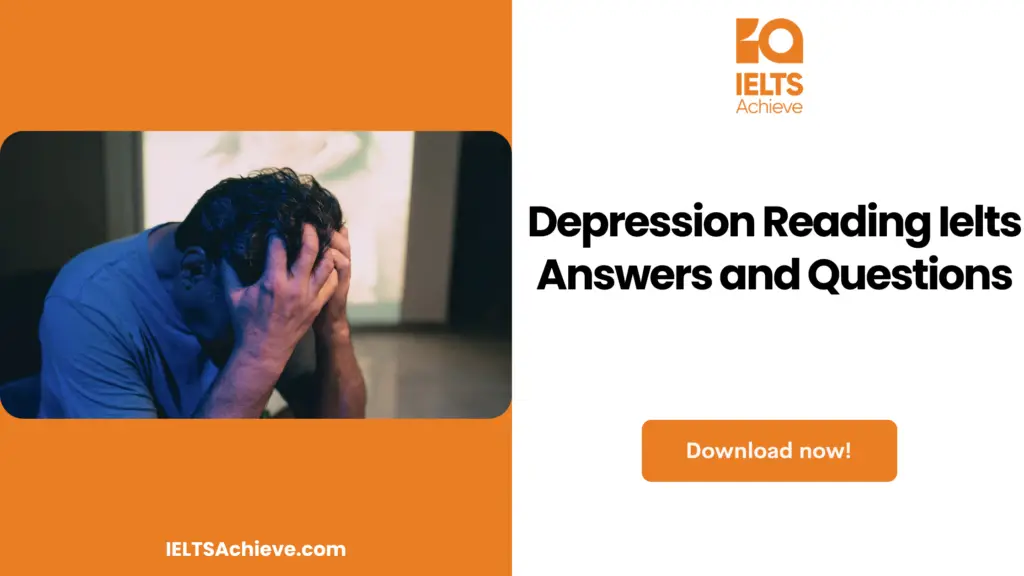The Blog post contains the following IELTS Reading Questions:
- IELTS Reading Locating Information
- IELTS Reading Matching Features
- IELTS Reading Summary Completion
Stay informed and prepared for success – Explore our comprehensive Reading Test Info page to get valuable insights, exam format details, and expert tips for mastering the IELTS Reading section.
IELTS Reading Passage – Depression

Depression
Mental illnesses are often harder for people who don’t have them to understand than physical ones. We may find it easy to feel sorry for people who have to deal with a physical illness or disability, but being mentally ill is often seen as a bad thing, or people think that people with mental illnesses are weak and can’t handle the real world. The stresses of modern life seem to have led to a rise in emotional problems, and in recent years, many governments have been trying to make the general public more aware of mental illness and related conditions and more sympathetic toward those who have them.
Clinical depression, also called “major depressive disorder,” is a state of extreme sadness or hopelessness that affects up to almost 20% of the population at some point in their lives before the age of 40. Studies have shown that this disorder is the leading cause of disability in North America. In the UK, almost 3 million people are said to be diagnosed with some form of depression at any given time, and experts think that as many as 9 million other cases may go undiagnosed. The World Health Organization thinks that by 2020, clinical depression may become the second most common cause of disability around the world. But these numbers aren’t supported by everyone in the field. Some experts think that the diagnostic criteria used to identify the condition aren’t precise enough, leading to other types of depression being wrongly labelled as “clinical.”
As humans, it’s normal for us to feel sad or down when bad things happen in our lives, like losing a loved one, losing a job, or breaking up with someone we care about. Some of us may even go through periods of depression and low motivation that have no obvious cause. Clinical depression is a long-term state of feeling bad that doesn’t have a clear cause. People with it get stuck in a downward spiral of negative thoughts and often feel irritable, tired all the time, and unmotivated. People with clinical depression are thought to be more likely to try drugs or even kill themselves than the rest of the population.
Clinical depression is usually diagnosed when a person has an overly sad mood and/or “anhedonia,” which is the inability to feel pleasure from positive experiences like enjoying a meal or a pleasant social interaction, for two weeks or more, along with five or more other known symptoms. There may also be overwhelming feelings of sadness, the inability to sleep or the need to sleep too much, feelings of guilt, nervousness, abandonment, or fear, the inability to concentrate, problems with memory, a fixation on death, or a sudden change in eating habits that causes weight gain or loss.
Clinical depression was once thought to be caused only by a chemical imbalance in the brain. Even though serotonin and norepinephrine, chemicals that make you feel good, are still commonly used in anti-depressants, experts now think that the onset of depression may be caused by a number of physiological and social-psychological factors that often work together. Treatment methods vary a lot from place to place and are often based on the person’s specific situation. However, medication and psychotherapy are usually used together in some form. When other methods don’t work, electroconvulsive therapy (ECT), which is more controversial, may also be used. In extreme cases, when a person’s behaviour shows that they may hurt themselves physically, psychiatric hospitalization may be necessary as a form of intensive therapy.
Some recent studies, like those published by the Archives of General Psychiatry, say that about a quarter of clinical depression cases should be seen as significant but still normal sadness and an inability to deal with life’s challenges. This means psychotherapy, not medication, is needed to treat these people.
Most of the time, getting better through psychotherapy takes longer than getting better through medication. However, once some people get better through psychotherapy, their improvements last longer and are more stable than those who get better through medication. There are different ways to do counselling, but they all aim to improve the person’s ability to function on a personal and social level. During sessions, people are encouraged to have a more positive view of themselves and their relationships. This is done to help people replace negative thoughts with more positive ones.
It’s clear that some people are more likely to get depressed than others. But it’s still not clear if this is really a genetic trait or if it could be caused by biological and environmental factors that affect everyone in the same family. In some cases, people with depression may need to unlearn certain habits and ways of thinking that they have picked up over the course of their lives. They may also need to come up with new ways to deal with problems, undoing patterns of destructive behaviour that they may have picked up from their role models.
Unlock your full potential in the IELTS Reading section – Visit our IELTS Reading Practice Question Answer page now!
Recommended Questions:
Renewable Energy IELTS Reading Question with Answer
Depression Reading Questions
Questions 1 – 5
Reading Passage 1 has seven parts, labelled A to G. Write the correct letters A–G on your answer sheet next to 1–5.Which paragraph has the information below?
- Specific details on how persons with a diagnosis of depression may be more susceptible than others in society
- Information regarding situations in which pharmacological treatment is ineffective.
- Information regarding the views of society toward depression and similar illnesses.
- Reasons why projections of the incidence of future case growth may be excessively optimistic.
- Details of therapy options for depression in the worst-case situation.
Questions 6 – 8
Choose THREE letters A-G. Write your answers in boxes 6-8 on your answer sheet.(NB, Your answers may be given in any order)
Q) Which THREE of the following statements are true of depression?
A. Governments have often failed to educate the people about the illness.
B. The United States has the most significant recorded number of cases.
C. Depression may manifest itself through lethargy.
D. Divorce may be the catalyst for clinical depression.
E. Not all methods of treating depression are universal.
F. In recent years, prescribed medications have undergone profound changes.
G. In Britain, it is likely that there are a greater number of people living with the condition unaided than receiving official treatment.
Improve your performance in Matching Features questions by clicking here to access our comprehensive guide. Learn how to match specific features or characteristics with the options provided in the IELTS Reading section.
Questions 9 – 13
Complete the summary of paragraphs F and G with the list of words A-L below. Write the correct letter A-L in boxes 9-13 on your answer sheet.
Whilst recovery through counselling rather than medicine may be more 9 ________________ , results once achieved may have more 10 ________________ with some patients. Counselling sessions are geared towards improving the subject’s relationship with others and their own 11 _______________, encouraging sufferers of depression to take on a more 12 _______________ outlook. The extent to which genetic disposition and sociological factors impact on state of mind is 13_________________. Many people undergoing counselling therapy do so with the purpose of unlearning negative behaviour and reactions.
Unlock your full potential in the IELTS Reading section – Visit our IELTS Reading Practice Question Answer page now!
Recommended Questions:
Renewable Energy IELTS Reading Question with Answer
Depression Reading Answers
1. C
2. F
3. A
4. B
5. E
6. E
7. G
8. C
9. I
10. B
11. H
12. D
13. G
Download Depression Reading Ielts Answers and Questions

We hope you found this post useful in helping you to study for the IELTS Test. If you have any questions please let us know in the comments below or on the Facebook page.
The best way to keep up to date with posts like this is to like us on Facebook, then follow us on Instagram and Pinterest. If you need help preparing for the IELTS Test, join the IELTS Achieve Academy and see how we can assist you to achieve your desired band score. We offer an essay correction service, mock exams and online courses.

